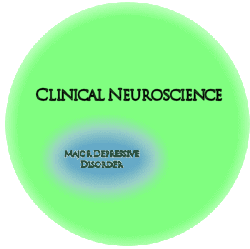It would be hard to mount an argument that mental illness is all brain disease. In fact, I’ve never heard anyone suggest that mental illness cannot be caused by problems in the mind. Rather, the argument has been that the various theories of how the mind is involved in creating mental pain are attacked as unscientific [which is, at a certain level, true]. It is a fruitless endeavor to defend against those criticisms. Likewise, I can’t imagine challenging the idea that problems in the brain can cause mental illness. That seems self evident as well, though the ideas about the mechanisms also remain at the level of hypothesis at best – equally questionable. The mind/brain dichotomy was in place at the opening of the twentieth century and an integral part of the development of the specialty of psychiatry [as a separate entity from neurology]. Traditionally, Emil Kraepelin and colleague Alois Alzheimer were associated with the classification of the major psychiatric syndromes – Dementia Praecox [Schizophrenia], Manic-Depressive Illness [Bipolar Disorders], Melancholia, Presenile Dementia [Alzheimer’s Disease], etc. While only a few of the major psychiatric syndromes were known to be brain disorders [Alzheimers, General Paresis, etc.], the others have been thought of using a medical model and assumed to be brain diseases – probably biological – for a myriad of reasons. While Sigmund Freud’s and the psychoanalysts’ ideas seem brilliant to some and mumbo jumbo to others, the demonstration that mental illness can be caused by the mind has become part of our everyday thinking, and psychoanalytic treatment heavily influenced the profession of dynamic psychotherapy, joined later by other disciplines with other approaches – notably the clinical psychologists. Diseases of the mind have lived in the probably not biological realm of Mental Illness [the quotation marks below mean probably]:


Unlike most of the rest of medicine, in psychiatry, all boundaries are at best fuzzy [right]. From the point of view of the Third Party Carriers [Insurance], Mental Illness with its fuzzy borders and sometimes long and nebulous treatments were a nightmare. They weren’t keen on funding psychotherapy, particularly in the absence of objective markers for illness, treatment, or endpoint. So when Managed Care appeared to try to contain healthcare costs, anything psychiatric became a ready target. Managed Care became a major player in the revision of psychiatry that resulted in the DSM-III Diagnostic Manual.
Had the DSM-III categorized only the known brain diseases, the domain of psychiatry would’ve been very small indeed. Had it included both known brain diseases and our probably biological disorders, the domain would’ve still remained small. That left the segment of the domain in yellow to deal with, and from the point of view of someone trying to "classify" things, it was a nightmare. Nobody working with people in that realm used "medical diagnosis" as a paradigm for classification. The analysts and dynamic psychiatrists made the distinctions among acute neuroses or personality type, but even those designations were overridden by individual formulations. The behaviorists and later cognitive behaviorists looked at maladaptive thinking or patterns of behavior rather than "diagnosis." Most of us that worked in the "yellow area" felt comfortable with paragraphs or pages, but had a hell of a time with a little box for a standard diagnosis, or a code number. Had I been an actuary or an insurance executive, I’d have pulled my hair out too. In reality, even the border between mental illness and no mental illness wasn’t slightly clear, much less the divisions within the domain itself. The subjectivity in the "yellow area" was unavoidable – a fertile area for fraud, mistakes, confusion, abuse, etc. The third party payers saw it as a black hole in need of filling.
So the DSM-III tried to bring clarity to the confusing areas by defining disorders descriptively, signs and/or symptoms grouped by mutually validated criteria – objectify the subjective. A driving force behind the DSM-III came from the Washington University group who were champions of medical, biological, non-psychological, non-psychoanalytic psychiatry. So as well as descriptive, the resulting DSM-III eliminated some of the traditionally psychological probably not biological categories by merging them into other diagnoses – most remarkably depression. Depression was given a single broad container, Major Depressive Disorder, in the homogeneous descriptive world of the DSM-III:

In many dimensions, the DSM-III, DSM-IIIR, DSM-IV, DSM-IVTR are politically and financially driven rather than medically. But in this particular area, they are actually anti-medical, because they even go against the basic descriptive motif that supposedly drives this diagnostic system:

My guess would be that a non-trained observer could sort the patients now classified as Major Depressive Disorder into two distinct piles after an interview – probably not biological and probably biological – with little overlap. Most trained observers might do it in the waiting room or soon thereafter. I have been encouraged to accept that the motive behind creating and maintaining this political category was to insure the removal of Depressive Neurosis [expunging psychoanalytic concepts from the DSM] rather that having something to do with the pharmaceutical industry which has collected multi-billions as a result. The reason that it’s so hard for me to accept is that I was there when it happened, and my memory is fairly clear. It felt like the drug companies were there from the start.
When our new chairman arrived in 1983, from the outset, he spoke of little except research, and it quickly became clear that he meant pharmaceutical research. In any clinical or theoretical discussion, his points were monotonous. If anything non-biological was mentioned, he said something like, "How do you know it’s not abnormal levels of dopamine" [or some other chemical]. In our first conversation, he found out that I’d done an NIH fellowship in Immunology as an Internist and wanted me to do research in psychoimmunology [I’d never heard that word before]. I’m pretty sure I heard the term "chemical imbalance" used before I left in 1985, two years before Prozac® was introduced. By the time Charlie Nemeroff arrived as Chairman in 1991, the drug researchers were fully in place and up and running. Dr. Nemeroff had already testified to the FDA as an Eli Lilly expert that Prozac® did not cause suicidal thoughts. So if the decision to create Major Depressive Disorder was not influenced by the drug industry, they sure picked up on the implications and were Johnny on the spot in their response with ready and willing KOLs. That Depressive Neurosis became probably biological and something to treat with drugs just seemed to happen overnight. Early in my practice, I saw patients who wanted me to get on their "panel" or call their carrier to "preapprove" therapy. I did it a couple of times until yet another reviewer said, "Doctor. Have you tried this patient on Prozac®?" [that reviewer was an ENT physician – I asked]. I realized that something very not okay with me was happening. After that, I gave people bills with the appropriate DSM and CPT codes and let them deal with their insurance companies themselves. Life is too short for such things. But this wasn’t just happening in Atlanta Georgia. It happened everywhere in the country, and money flowed into our hungry specialty. What started as a descriptive DSM-III was rapidly morphed into a world later conceptualized by Tom Insel, Director of the NIMH, as…

As we will detail below, we are concerned about the lowering of diagnostic thresholds for multiple disorder categories, about the introduction of disorders that may lead to inappropriate medical treatment of vulnerable populations, and about specific proposals that appear to lack empirical grounding. In addition, we question proposed changes to the definition[s] of mental disorder that deemphasize sociocultural variation while placing more emphasis on biological theory. In light of the growing empirical evidence that neurobiology does not fully account for the emergence of mental distress, as well as new longitudinal studies revealing long-term hazards of standard neurobiological [psychotropic] treatment, we believe that these changes pose substantial risks to patients/clients, practitioners, and the mental health professions in general.
A recent publication by the Task Force, The Conceptual Evolution of DSM-5 [Regier, Narrow, Kuhl, & Kupfer, 2011], states that the primary goal of DSM-5 is “to produce diagnostic criteria and disorder categories that keep pace with advances in neuroscience.”
incredibly helpful and useful posting. Now I just need to re-read it half a dozen times.
I don’t think it will ever stop unless psychiatrists form a new professional organization and collectively change practice, create and enforce a new code of ethics/standards of care and practice and take a radical patient centered advocacy stance. What’s needed is nothing less dramatic than a modern day Flexner Report. Fat chance of that.
The treatment target is always moving, as there are markets to be conquered and profits to be made. Today’s case in point is Neuralstem’s new MGH Fava designed tiral to grow the hippocampus – being marketed in 1B trials for depression, bipolar, schizophrenia…
Press release: http://seekingalpha.com/news-article/2114567-neuralstem-s-nsi-189-trial-in-major-depressive-disorder-receives-fda-approval-to-advance-to-phase-ib
Company website http://seekingalpha.com/news-article/2114567-neuralstem-s-nsi-189-trial-in-major-depressive-disorder-receives-fda-approval-to-advance-to-phase-ib
Happy new year. Mickey, readers and commenters. Thanks for all you are doing to expose and explain. May the next steps of “occupy psychiatry” be quick and effective, as well.